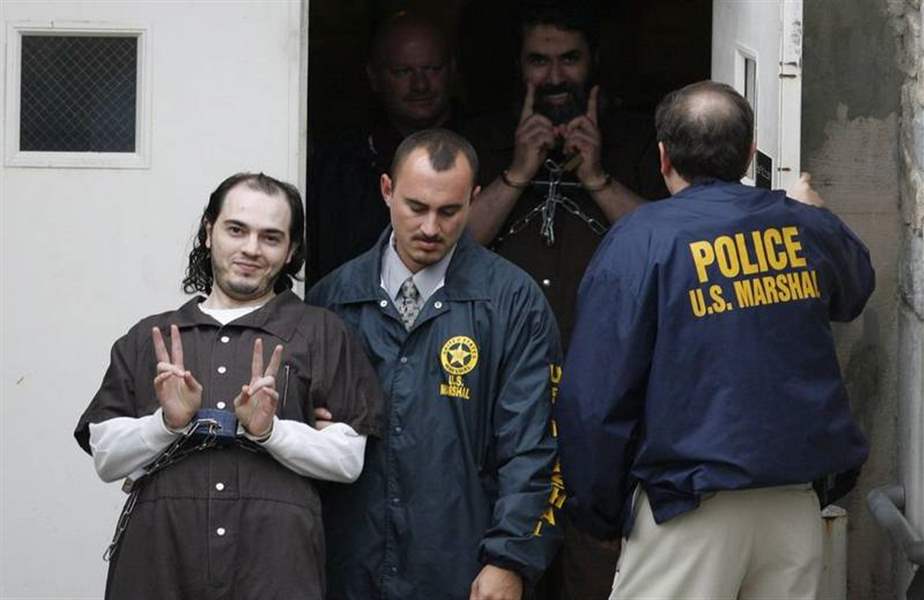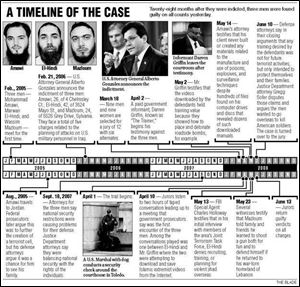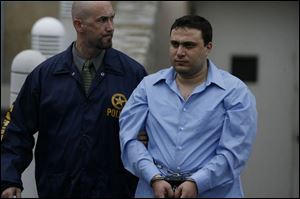
3 guilty in plot to kill troops; Toledo verdict hailed as 1st on 'home-grown' terrorism cell
6/14/2008
Mohammad Amawi, left, and Marwan El-Hindi, center, leave federal court. (THE BLADE/JEREMY WADSWORTH) <br> <img src=http://www.toledoblade.com/assets/gif/weblink_icon.gif> <b><font color=red>COMMUNITY</b></font color=red>: <a href=" /apps/pbcs.dll/article?AID=/20080614/NEWS02/806140402" target="_blank "><b>Local Muslims worry about stereotyping</b></a> <br> <img src=http://www.toledoblade.com/assets/gif/weblink_icon.gif> <b><font color=red>ACLU</b></font color=red>: <a href=" /apps/pbcs.dll/article?AID=/20080614/NEWS02/806140331" target="_blank "><b>Scholar warns of FBI reliance on informants</b></a>
The convictions yesterday of three local men of Middle Eastern descent for terrorist-related crimes are being hailed by the federal government as a landmark victory in the war on terrorism.
Mohammad Amawi, Marwan El-Hindi, and Wassim Mazloum were found guilty by a jury in U.S. District Court in Toledo of conspiring to plan attacks to kill or injure U.S. troops in Iraq and other countries - a crime that carries a maximum penalty of life in prison - and providing materials and support to terrorists.
A sentencing date has not been scheduled.
While it was not the first time that multiple defendants accused of terrorist acts were convicted of all counts in a jury trial, it was the first successful prosecution of defendants on the charge of distributing information about the making and use of an explosive device, a U.S. Justice Department spokesman said.
Dean Boyd, the spokesman, said the Toledo case was the first "home-grown" terror cell convictions for plots against U.S. soldiers in the Middle East.
 Toledo terror trial timeline " rel="storyimage1" title="3-guilty-in-plot-to-kill-troops-Toledo-verdict-hailed-as-1st-on-home-grown-terrorism-cell-2.jpg"/>
Toledo terror trial timeline " rel="storyimage1" title="3-guilty-in-plot-to-kill-troops-Toledo-verdict-hailed-as-1st-on-home-grown-terrorism-cell-2.jpg"/>
<br> <img src=http://www.toledoblade.com/assets/gif/TO17150419.GIF> <b><font color=red>VIEW</b></font color=red>: <a href=" /assets/pdf/TO48372614.PDF" target="_blank "><b>Toledo terror trial timeline</b></a>
Others have been convicted of trying to carry out plots, but they were not living in the United States nor were they U.S. citizens, he said.
"This case demonstrates the stark reality of home-grown terrorism. If a plot like this can be developed in Toledo, it can happen anywhere," said C. Frank Figliuzzi, special agent in charge of the Cleveland FBI office.
"With radical extremists in our midst, the FBI works day and night with our law enforcement and intelligence partners to pursue suspected terrorists and their supporters," he said.
The jury of six men and six women reached its decision after 2 1/2 days of deliberations.
They were given the case Tuesday night after listening to three days of closing arguments.
None of the jurors could be reached last night for comment.

Wassim Mazloum, a former engineering student at the University of Toledo, was convicted of several terrorism-related charges. His defense attorney Jeff Helmich said he will appeal yesterday s verdict. Mazloum, who was released on bail in September, was taken into custody yesterday and sent to a federal prison in Milan, Mich., to await a sentencing hearing.
Amawi and El-Hindi also were found guilty on two counts of distributing information regarding explosives.
Judge James Carr said that presentencing reports on the defendants should be available in 2 1/2 to three months.
However, defense attorneys said objections to government sentencing enhancements could push sentencing into the fall.
All the defendants are Muslim.
El-Hindi, 45, is a U.S. citizen who was born in Jordan; Mazloum, 27, came to the United States from Lebanon in 2000, and Amawi, 28, who was born in the United States, holds Jordanian citizenship.
The defendants showed little emotion as the guilty verdicts were announced.
But several of the defense attorneys appeared visibly upset, some to the point that they were struggling to fight back tears.
A handful of the men's relatives were in the courtroom for the verdicts.
A sister and aunt of Mazloum comforted one another as they wept in the courtroom after he and his co-defendants were taken away in handcuffs.
The trial, the first in northern Ohio to address terrorist crimes, began April 1 with opening statements, and followed with Darren Griffin - the government's key witness and paid FBI informant - taking the witness stand.
He was the first of 16 government witnesses.
A former U.S. Army soldier, he testified that he passed himself off as a convert to Islam with extremist views and blended into the Toledo Muslim community.
The recordings and videos that Mr. Griffin, 42, secretly made of meetings and phone calls with the defendants for about two years beginning in 2004 became the nucleus of the government's case.
He recorded the defendants at their homes, when they ate together, and when they practiced shooting at a gun range.
Prosecutors played more than 30 hours of the 300 hours of taped conversations provided by Mr. Griffin. He was paid $350,000 by the government for his work.
Jurors were shown videos that the men had of gruesome beheadings, U.S. Marines killing Iraqis, tanks being blown up, and a Marine being killed at a checkpoint in Iraq.
Patrick Rowan, acting assistant attorney general for national security in Washington, released a written statement regarding the convictions.
"Today's verdicts should send a strong message to individuals who would use this country as a platform to plot attacks against U.S. military personnel in Iraq and elsewhere," it said.
"This case also underscores the need for continued vigilance in identifying and dismantling extremist plots that develop in America's heartland."
Attorney Stephen Hartman, a member of the El-Hindi defense team, vowed to appeal the convictions and said work would begin immediately on pleadings on his client's behalf arguing for a lenient sentence.
"I am extremely disappointed with the verdicts. We had a judge who worked very hard to assure a fair trial. We had an incredible, attentive jury. I think they were the most attentive jury that I have ever seen. They listened very closely to all the evidence. They just disagreed with our theory," he said.
Mr. Hartman argued at trial that El-Hindi got caught in a plot orchestrated by what he described as an overzealous informant who milked the government for money.
He said El-Hindi never would have gotten involved in the plot if he had not met Mr. Griffin.
"What made Marwan El-Hindi different from the other two defendants was that Griffin started working on him back in 2002. But I don't think the jury put a whole lot of stock in what Griffin said. They paid very close attention to the recordings. I think that is what was most important to them," he said.
"There were a certain number of recordings that were important to the jurors that they listened to multiple times. That is what they used to form the basis of their decision. I don't think a lot of the other evidence mattered to them."
The jury considered recorded conversations of the defendants as they viewed videos produced by Islamic extremist groups, planning sessions to train for "jihad," or holy war, and sniper training, and step-by-step instructions on how to build and detonate a suicide bomb vest.
Two Chicago-area cousins, Khaleel Ahmed and Zubair Ahmed, also are accused of taking part in the conspiracy to "kill, kidnap, or maim" U.S. military troops and others overseas. A trial in federal court in Toledo is scheduled for next year.
Amawi and El-Hindi, the father of seven, have been in federal custody since February, 2006, when the indictment was announced.
Mazloum, who was an engineering student at the University of Toledo, was released last September on a $300,000 property bond. He was taken into custody again and sent to the federal prison in Milan, Mich., with his co-defendants.
Attorney Jeff Helmich said he and Mazloum's defense team were deeply disappointed with the verdicts and vowed to fight for their client by keeping the case in the courts on appeal.
"Mr. Mazloum continues to maintain his innocence. We will pursue every avenue of appeal," he said.
Judge Carr gave the defendants until Sept. 15 to file appeals on the convictions and gave federal prosecutors until Oct. 15 to respond to the motions.
The most recent records from the Department of Justice - as of Nov. 15, 2007 - indicate that 527 defendants had been charged in terrorism and terrorism-related criminal cases arising from investigations conducted after the attacks on the World Trade Center and Pentagon in 2001.
The cases resulted in 319 convictions, including 263 guilty pleas, the department reported. There were an additional 176 cases pending trial or awaiting extradition as of November.
Amawi was indicted on an additional count for making threats while speaking with others to kill or inflict bodily harm against President Bush. A trial on that charge has not been scheduled.
Ed Bryan, a federal public defender who was among the attorneys representing Amawi, said he believed jurors couldn't relate to the Islamic faith, culture, and politics of his client.
"I don't think there [were] any threats that he and the others would carry out. They never talked about doing anything specifically. There was never a plan," he said.
"I don't think their thoughts and opinions were any different than that of those from the part of the world they are from."
Staff writer Kate Giammarise contributed to this report.
Contact Mark Reiter at:
markreiter@theblade.com
or 734-241-3610.